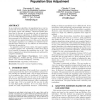Free Online Productivity Tools
i2Speak
i2Symbol
i2OCR
iTex2Img
iWeb2Print
iWeb2Shot
i2Type
iPdf2Split
iPdf2Merge
i2Bopomofo
i2Arabic
i2Style
i2Image
i2PDF
iLatex2Rtf
Sci2ools
GECCO
2006
Springer
2006
Springer
Revisiting evolutionary algorithms with on-the-fly population size adjustment
In an evolutionary algorithm, the population has a very important role as its size has direct implications regarding solution quality, speed, and reliability. Theoretical studies have been done in the past to investigate the role of population sizing in evolutionary algorithms. In addition to those studies, several self-adjusting population sizing mechanisms have been proposed in the literature. This paper revisits the latter topic and pays special attention to the genetic algorithm with adaptive population size (APGA), for which several researchers have claimed to be very effective at autonomously (re)sizing the population. As opposed to those previous claims, this paper suggests a complete opposite view. Specifically, it shows that APGA is not capable of adapting the population size at all. This claim is supported on theoretical grounds and confirmed by computer simulations. Categories and Subject Descriptors: I.2.8 [Artificial Intelligence]: Problem Solving, Control Methods, and Se...
Evolutionary Algorithms | GECCO 2006 | Optimization | Population Size | Population Sizing Mechanisms |
| Added | 23 Aug 2010 |
| Updated | 23 Aug 2010 |
| Type | Conference |
| Year | 2006 |
| Where | GECCO |
| Authors | Fernando G. Lobo, Cláudio F. Lima |
Comments (0)

